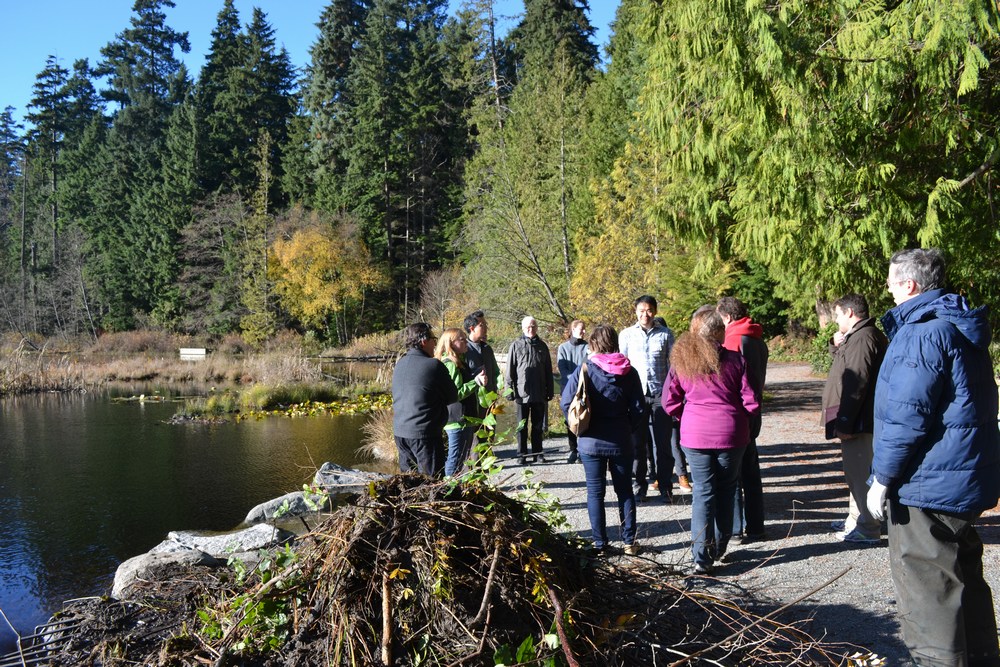From Watersheds to Ditches: Wetlands Workshop for Municipalities Investigates Wetland Conservation in Metro Vancouver
Note to Readers:
In February 2014, the BC Wildlife Federation (BCWF) released a summary report on their Wetlands Workshop for Municipalities – hosted in November 2013 at the Stanley Park Ecology Centre in the City of Vancouver. The workshop targeted municipal and regional staff in Metro Vancouver to strengthen the region’s capacity to secure wetlands as green infrastructure for the benefit of human health and nature.
Working from watersheds and focusing down to sites, this one-day workshop explored ways to integrate wetland conservation through a variety of tools – from policies to design considerations for built infrastructure. To download a copy of the summary report, click on Synopsis of Wetlands Workshop for Municipalities.
Is your municipality doing enough to prevent downstream impacts from rainwater runoff while maintaining healthy aquatic habitat?
“The workshop built upon the momentum of several other workshops and initiatives that relate to wetland conservation in the Lower Mainland, including: several working group workshops for species and ecosystems at risk hosted by the South Coast Conservation Program, a BCWF-led municipal workshop in Squamish (2012), and the release of the Lower Mainland’s Wetlands Declaration in May of 2013,” reports  Christine Cooper, Wetland Intern with the BC Wildlife Federation. She organized the workshop, compiled the summary report and wrote the story below.
Christine Cooper, Wetland Intern with the BC Wildlife Federation. She organized the workshop, compiled the summary report and wrote the story below.
“This workshop was held in partnership with Stanley Park Ecology Society, and was made possible with the financial support of Ducks Unlimited, Wildlife Habitat Canada, Environment Canada, and Shell.”
An Introduction to Wetland Conservation
 Neil Fletcher, Wetlands Education Program Coordinator with the BC Wildlife Federation and Chair of the Wetland Stewardship Partnership of BC, began the day with a brief workshop overview and introduction to wetlands conservation activities and initiatives that related to wetland conservation in the Lower Mainland. Neil also drew attention to the activities of the Wetland Stewardship Partnership (WSP) – a multi-agency group dedicated to the conservation of wetlands and other sensitive ecosystems in British Columbia.
Neil Fletcher, Wetlands Education Program Coordinator with the BC Wildlife Federation and Chair of the Wetland Stewardship Partnership of BC, began the day with a brief workshop overview and introduction to wetlands conservation activities and initiatives that related to wetland conservation in the Lower Mainland. Neil also drew attention to the activities of the Wetland Stewardship Partnership (WSP) – a multi-agency group dedicated to the conservation of wetlands and other sensitive ecosystems in British Columbia.
Tools to Protect Species and Communities At Risk
Pamela Zevit, Coordinator for the South Coast Conservation Program, presented an overview of regional tools to protect species and communities at risk. SCCP recently hosted four regional workshops on Species and Ecosystems at Risk (SEAR), bringing local government representatives together to overcome barriers and challenges to integrating SEAR conservation.
Watershed Blueprints Will Help Municipalities Integrate & Deliver on Regulatory Compliance
Wetland conservation from a watershed health context was presented by Kim Stephens, Executive Director of the Partnership for Water Sustainability in BC. He explained that the Province of British Columbia adopted the Water Balance Methodology in 2002 as the foundation for a performance target approach to capture rain where it falls; and initiated changes in the ways rainwater runoff is returned to streams. Kim advocated for the culmination of positive change through community  scale development activities and projects that enhance green infrastructure within the built environment.
scale development activities and projects that enhance green infrastructure within the built environment.
To learn more about the presentation by Kim Stephens, click on Wetlands, Not Wastelands: Workshop for Metro Vancouver Municipalities showcased “Water Sustainability Action Plan for BC”.
Risks, Benefits and Design Considerations for Amphibian Species
Elke Wind, biologist, outlined rainwater management considerations for aquatic species, focusing on design considerations for amphibians. Amphibians are particularly vulnerable due to their semi-permeable skin and both aquatic and terrestrial habitat requirements – making them good indicators of wetland health. The variety of artificial water features in the developed environment can endanger amphibians as stormwater ponds typically contain contaminants and non- native species. To prevent the need for costly salvage operations, techniques to increase amphibian survival can be used including exclusion techniques to prevent amphibian access to contaminated sites or creating stormwater ponds that better mimic the natural habitat.
native species. To prevent the need for costly salvage operations, techniques to increase amphibian survival can be used including exclusion techniques to prevent amphibian access to contaminated sites or creating stormwater ponds that better mimic the natural habitat.
Municipal /Regional Policy & Regulatory Options
Deborah Carlson, Staff Counsel for West Coast Environmental Law, focused on legal tools for protecting wetlands. Deborah pointed out difficulties in using the legal  system to protect areas beyond riparian setbacks because most laws were originally created to protect private property rights and facilitate human occupation of land. To counter these difficulties, the Green Bylaws Toolkit is a document that comprehensively outlines land use regulatory tools that can promote conservation of sensitive ecosystems and green infrastructure, which can help promote wetland conservation at municipal and regional scales.
system to protect areas beyond riparian setbacks because most laws were originally created to protect private property rights and facilitate human occupation of land. To counter these difficulties, the Green Bylaws Toolkit is a document that comprehensively outlines land use regulatory tools that can promote conservation of sensitive ecosystems and green infrastructure, which can help promote wetland conservation at municipal and regional scales.
Beaver Lake Restoration Project
A unique component of the workshop involved the opportunity to provide feedback for the Beaver Lake public visioning process, an urban wetland in the heart of Stanley Park. Representatives from Stanley Park Ecology Society and Vancouver Parks Board presented the history and current issues of Beaver Lake, with consultants presenting concept designs for public input. Workshop participants had the opportunity to walk to Beaver Lake to further discuss challenges and opportunities.
Opportunities for Strategic Direction
In the afternoon, participants completed an interactive activity to allocate 10 resource units under categories including Information, Political Will, Instruments and Other. Participants were encouraged to elaborate with comments regarding each category in the “swamp bubbles” provided.
The final activity was a breakout session, where speakers paired off to lead a discussion on one of the four workshop themes: developing Integrated Stormwater Management Plans with green infrastructure considerations, policy and regulatory development; urban wetlands; and integrating wildlife-friendly wetland management practices into urban planning.
With representation from 7 municipalities and districts, a major theme that emerged from the workshop was that wetland conservation in Metro Vancouver requires multiple areas of focus, including regulatory tools, staff, public awareness and engaged council.
To Learn More:
To download a copy of the summary report, click on Synopsis of Wetlands Workshop for Municipalities.
To read a story posted previously on the Green Infrastructure community-of-interest, click on Wetlands, Not Wastelands: A Workshop for Metro Vancouver Municipalities (November 19).

At lunchtime, workshop participants went for a walkabout at Beaver Lake in Stanley Park to view the scope of the restoration project



